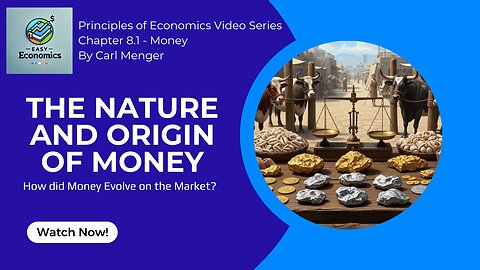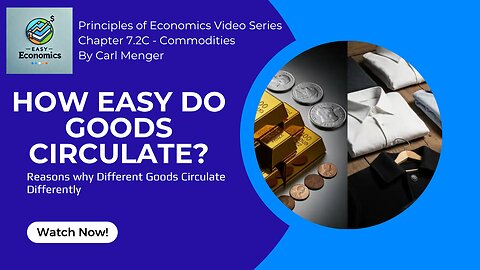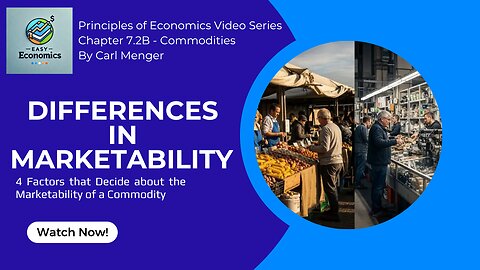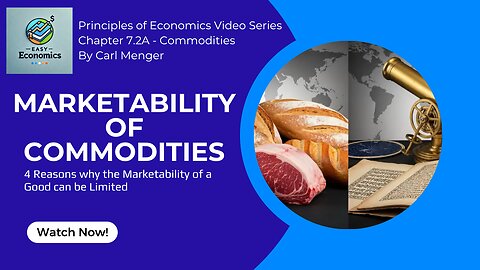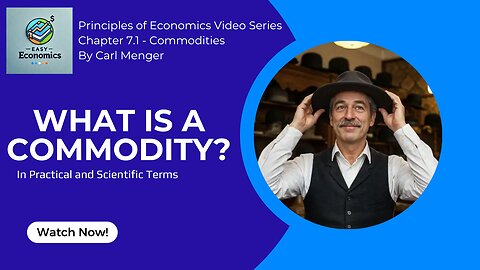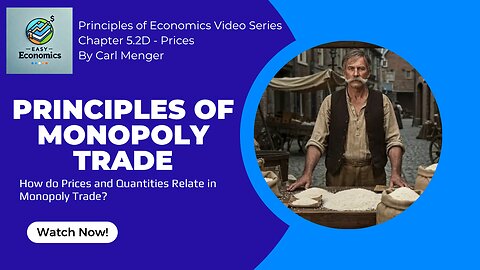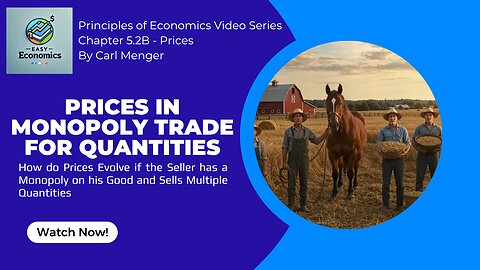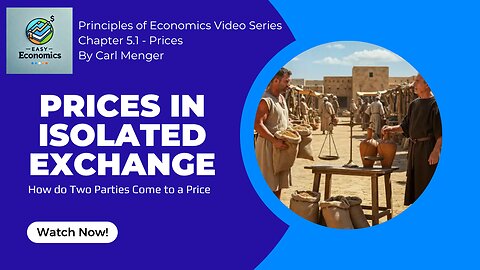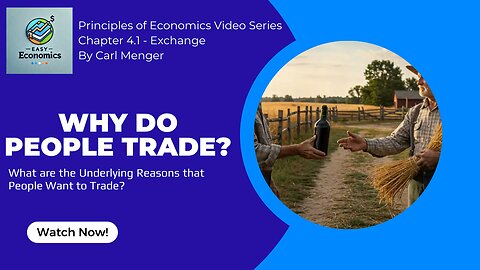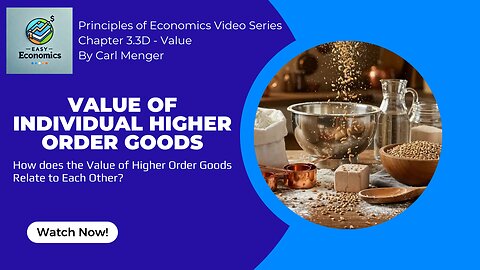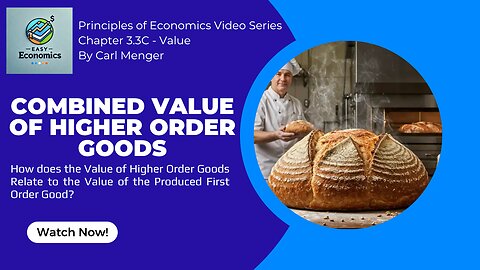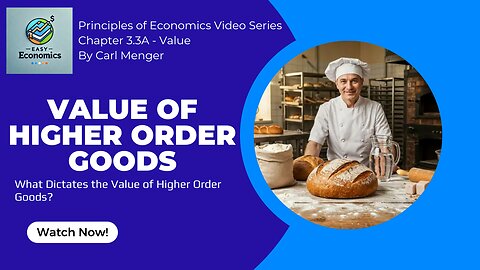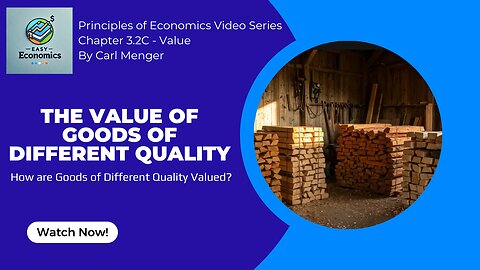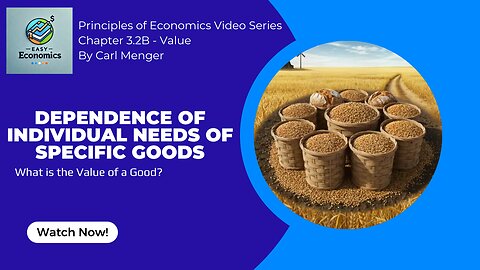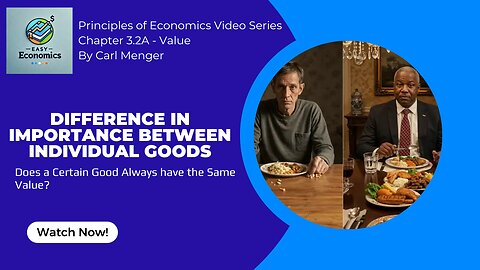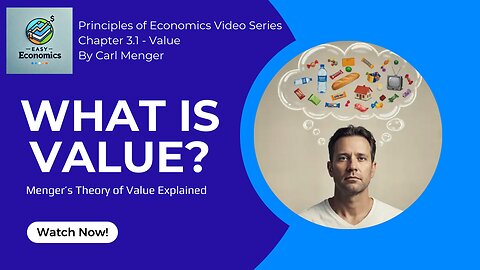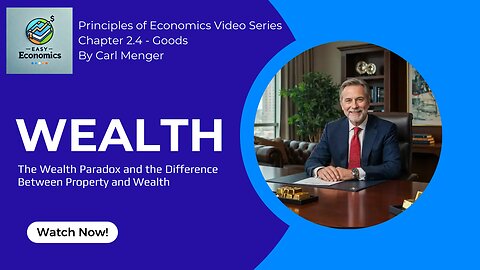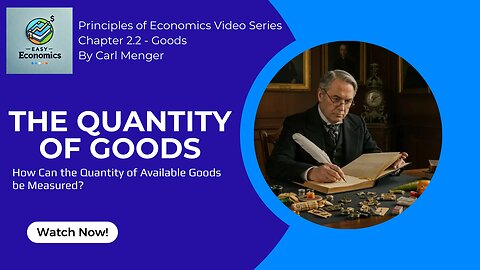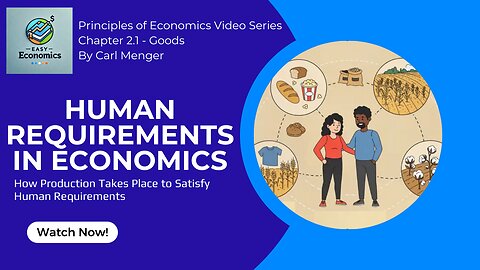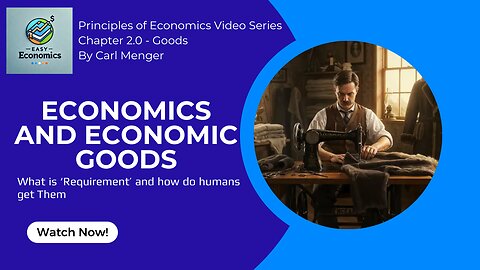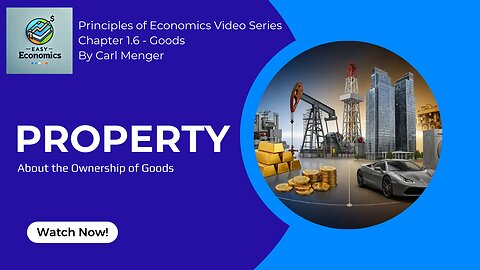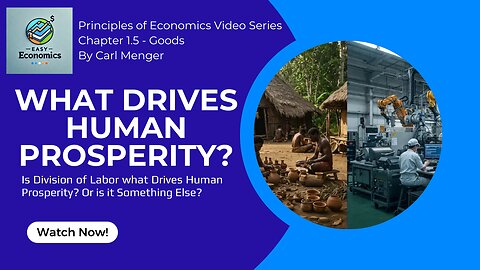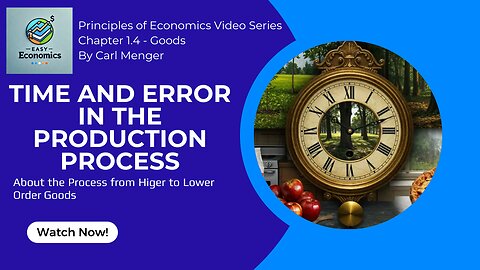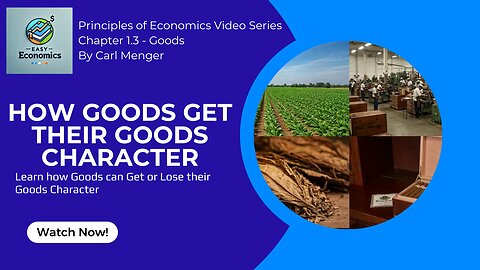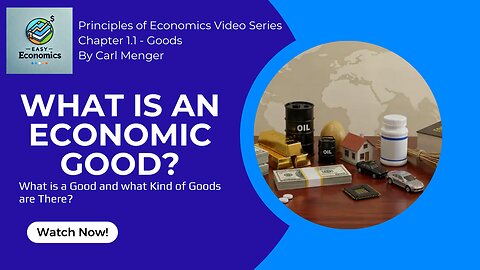Premium Only Content

Principles of Economics by Carl Menger Chapter 8.1 - The Nature and Origin of Money
Principles of Economics by Carl Menger Chapter 7.2C - Circulability of Commodities
Principles of Economics by Carl Menger Chapter 7.2B - Differences in Marketability of Commodities
Principles of Economics by Carl Menger Chapter 7.2A - Marketability of Commodities
Principles of Economics by Carl Menger Chapter 7.1 - What is a Commodity?
Principles of Economics by Carl Menger Chapter 5.3C - Competition Policy
Principles of Economics by Carl Menger Chapter 5.3B - Price Formation by Competing Sellers
Principles of Economics by Carl Menger Chapter 5.3A - Price Forming and Distribution by Competition
Principles of Economics by Carl Menger Chapter 5.2D - Principles of Monopoly Trade
Principles of Economics by Carl Menger Chapter 5.2C - Market Dynamics of Monopoly Pricing
Principles of Economics by Carl Menger Chapter 5.2B - Price Forming in Monopoly Trade for Quantities
Principles of Economics by Carl Menger Chapter 5.2A - Price Formation in Monopoly Trade
Principles of Economics by Carl Menger Chapter 5.1 - Price Formation in Isolated Exchange
Principles of Economics by Carl Menger Chapter 5.0 - The Theory of Price
Principles of Economics by Carl Menger Chapter 4.2 - The Limits of Economic Exchange
Principles of Economics by Carl Menger Chapter 4.1 - Foundations of Economic Exchange
Principles of Economics by Carl Menger Chapter 3.3E - The Value of Land, Labour and Capital
Principles of Economics by Carl Menger Chapter 3.3D - The Value of Individual Higher Order Goods
Principles of Economics by Carl Menger Chapter 3.3C - Combined Value of Higher Order Goods
Principles of Economics by Carl Menger Chapter 3.3B - The Productivity of Capital
Principles of Economics by Carl Menger Chapter 3.3A - What Causes the Value of Higher Order Goods?
Principles of Economics by Carl Menger Chapter 3.2D - The Subjective Nature of the Measure of Value
Principles of Economics by Carl Menger Chapter 3.2C - Influence of the Quality of Goods on Value
Principles of Economics by Carl Menger Chapter 3 2B - The Value of Goods for Individual Needs
Principles of Economics by Carl Menger Chapter 3.2A - Difference in Importance for Individual Needs
Principles of Economics by Carl Menger Chapter 3.1 - The Theory of Value
Principles of Economics by Carl Menger Chapter 2.4 - What is Wealth?
Principles of Economics by Carl Menger Chapter 2.3 - Human Economy and Economic Goods
Principles of Economics by Carl Menger Chapter 2.2 - Available Quantities of Goods
Principles of Economics by Carl Menger Chapter 2.1 - Human Requirements in Economics
Principles of Economics by Carl Menger Chapter 2.0 - Economy and Economic Goods
Principles of Economics by Carl Menger Chapter 1.6 - Ownership of Goods
Principles of Economics by Carl Menger Chapter 1.5 - Causes of Human Prosperity
Principles of Economics by Carl Menger Chapter 1.4 -Time and Error in the Production Process
Principles of Economics by Carl Menger Chapter 1.3 - The Laws that Govern Goods Character
Principles of Economics by Carl Menger Chapter 1.2 - The Causal Connection Between Goods
Principles of Economics by Carl Menger Chapter 1.1 - The Nature of Goods
Principles of Economics by Carl Menger Chapter 5.2C - Market Dynamics of Monopoly Pricing
You want to read the book? Get it here: https://amzn.to/4cCPIQs
Watch the next video in this series: https://rumble.com/v6ugmul-principles-of-economics-by-carl-menger-chapter-5.2d-principles-of-monopoly-.html
Watch the video series from the start: https://rumble.com/playlists/I48mBTB4w2c
Watch our video about Carl Menger: https://rumble.com/v61z0l2-carl-menger-the-father-of-austrian-economics-and-subjective-value.html
How does a monopolist’s choice of price affect how much they sell and who gets to buy? In this video, we explore Carl Menger’s Principles of Economics, Chapter 5.2C: The Influence of Monopolist-Set Prices on Quantities Sold and Buyer Distribution.
In most real markets, monopolists don’t run auctions. Instead, they set a fixed price for their goods and let buyers choose how much to purchase. This practical method shapes the entire outcome of trade: who can buy, how much is sold, and how broadly the good spreads through the market.
Menger explains that if the price is too high, even the most eager buyer won’t purchase—and no sales happen. But if the price is reasonable, buyers will begin to purchase according to how much value each unit holds for them.
For example:
If the price is 75 units of grain, only the top buyer purchases one unit.
Lowering it to 62 units brings in another buyer and more sales.
Dropping to 54 units opens the market even more—more buyers, more units sold.
The core principles are simple but powerful:
1️⃣ Buyers whose valuation is below or equal to the price won’t buy.
2️⃣ Buyers whose valuation is above the price will buy up to their personal limit.
3️⃣ Lower prices increase participation and sales; higher prices do the opposite.
This dynamic explains why pricing decisions matter so much—not only for profits but also for how goods flow through society.
❓ Questions This Video Answers:
-How does a monopolist typically sell their goods?
-Why do high prices exclude buyers?
-What happens to total sales when prices are lowered?
-How do buyers decide how much to buy?
-What role does marginal utility play in purchase decisions?
-Why doesn’t a monopolist always set the highest price possible?
-How does price affect the distribution of goods in society?
-Why do lower prices reach deeper population groups?
-What is the relationship between set price and buyer participation?
-How does this model explain real-world monopoly pricing?
00:00 - Introduction to The Influence of Monopolist-Set Prices on the Quantities of the Monopoly Good
00:18 - Monopolist Pricing Strategies and Market Dynamics
01:19 - Impact of Price on Buyer Participation and Sales Volume
02:17 - Principles Governing Monopolist Pricing and Market Reach
03:15 - Conclusion
#MonopolyPricing #BuyerBehavior #CarlMenger
-
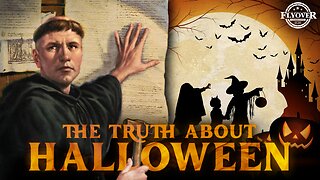 58:18
58:18
Flyover Conservatives
1 day agoThe Truth About Halloween that You DIDN’T Know - Holiday Special - Historian Bill Federer | FOC SPECIAL Show
51K7 -
 3:10:46
3:10:46
Ellie_roe
8 hours agoEllie and Errys Halloween Spooktacular || Random Horror Games
24.2K1 -
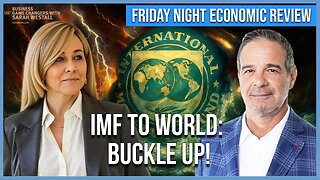 50:27
50:27
Sarah Westall
9 hours agoBig Banks Caught Rigging Market, IMF tells World to “Buckle Up” w/ Andy Schectman
43.6K19 -
 13:54
13:54
Degenerate Jay
16 hours ago $1.15 earned5 Best Superhero Movies To Watch On Halloween
22.9K5 -
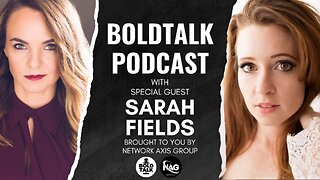 59:03
59:03
NAG Podcast
9 hours agoSarah Fields: BOLDTALK W/Angela Belcamino
39.4K10 -
 1:21:41
1:21:41
Glenn Greenwald
12 hours agoGlenn Takes Your Questions: On the Argentina Bailout, Money in Politics, and More; Plus: Journalist Jasper Nathaniel on Brutality and Settler Attacks in the West Bank | SYSTEM UPDATE #541
92K47 -
 3:10:08
3:10:08
Barry Cunningham
9 hours agoPRESIDENT TRUMP TO USE NUCLEAR OPTION? FOOD STAMPS END! | SHUTDOWN DAY 31
55.6K45 -
 1:06:56
1:06:56
BonginoReport
17 hours agoThe Battle Between Good & Evil w/ Demonologist Rick Hansen - Hayley Caronia (Ep.168)
105K39 -
 1:12:57
1:12:57
Kim Iversen
11 hours agoBill Gates Suddenly Says “Don’t Worry About Climate Change”?
94.1K69 -
 1:05:12
1:05:12
Michael Franzese
11 hours agoI Waited 50 Years to Tell You What Happened on Halloween 1975
47.6K20
